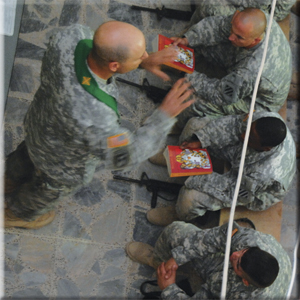Like any enlisted man or woman, Catholic chaplains have go training, and they don't get special treatment.
U.S. Navy chaplain Father David Daigle, a lieutenant colonel who blogs for CatholicMil.org and is now overseas, can attest. When he went through Navy Chaplains School in Newport, Rhode Island, he paid the price for making a mistake and was ordered into a sand pit where he was promptly doused with water, he told a newspaper from his home state of Connecticut.
His officer training was followed by seven weeks of chaplain school. But a priest's decision to go through this rigorous training is one he doesn't make all by himself. If he works for a diocese, he must first convince his bishop he's fit to serve in the U.S. military, whether during peace or war.
After gaining the endorsement of his local bishop, he must seek the approval of the archbishop of the Washington-based Archdiocese for the Military Services, which was established in 1985 by Pope John Paul II. The archdiocese represents all Catholics and chaplains in the U.S. armed forces.
Archbishop Timothy P. Broglio was installed January 2008 to lead the military archdiocese, and he promptly declared he would fix the shortage of priests in the U.S. military (he was not available for comment for this story).
"But the question remains: To what degree is the church able, when there are so few priests to begin with?" says Judy McCloskey, director of Catholicmil.org. "Under the circumstances, can we blame our bishops for being reluctant? Not really. The common objections do have answers though, and I encourage bishops to release to military service those priests who so request it."
In no way is the Catholic Church against having priests serve in the military, says Father James Steffes, executive director of the U.S. Bishops' Secretariat for Clergy, Consecrated Life, and Vocations, an office in the United States Conference of Catholic Bishops. But this doesn't mean the Catholic Church-which has problems of its own recruiting priests-is willing to have large numbers of priests or pastors leave their appointed parish, he says.
"I think there is a shortage of priests in the military in general- in all branches of the military, and not just in a war zone," Steffes says. "The numbers are increasing throughout the country, [but] they have a responsibility to serve their local flock first. If they have a shortage of priests, they have a need for their own diocese. The focus is first on their local need."















Add comment